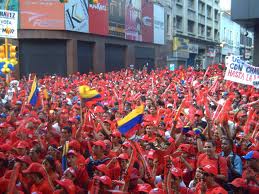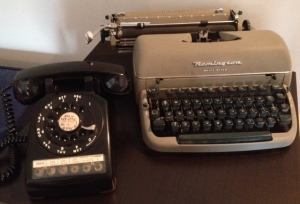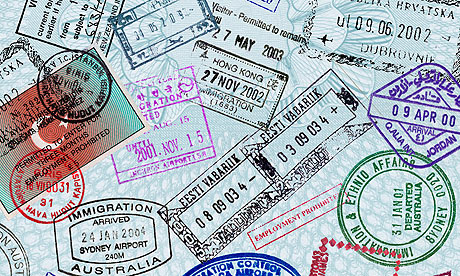I Need a Palanca
September 2, 2014 Leave a comment
The thought of renewing my driver’s license puts me in a bad mood. My experience with the DMV has always been a frustrating one with the long lines and regimented process. The last time I was there, I felt like a five-year old being reprimanded for forgetting my homework because I didn’t have the right documentation to prove I was who I claimed to be. (Despite holding a U.S. passport and a local utility bill in my name, I was turned away until I could produce my Social Security card.) Then there was the time I failed the eye exam and had to return after shelling out a fortune in an eye exam and news lenses, which I suppose is a good thing since we expect our fellow drivers to be able to see properly. The worst DMV experience I had was the driving test with the former drill sergeant who made me so nervous I could barely function. It’s a miracle that I ever secured my license.
While I didn’t drive during my time in Venezuela and never solicited a driver’s license, I was required to have a national identification card. The cedula is a plastic photo ID that both venezolanos and extranjeros (foreigners) are expected to carry at all times. People will ask you for your cedula number at every turn and you need to show it to gain access to office buildings, conduct banking transactions, and even check out at the grocery store. Once I got my resident visa, it was time to go to the Venezuelan version of the DMV to wait in the long lines and wade through the sea of red tape to solicit my cedula. Luckily, I had a palanca (a family friend just who happened to be the Vice Minister of Justice at the time) to facilitate the process and secure me not one but two ID cards in a matter of 15 minutes. I had one cedula to use and another to lose! I learned very quickly the benefits of being well-connected.
The Spanish word palanca means lever and much like a lever, a palanca is a personal connection who can open the door to opportunities that were previously unavailable to you. In a country where personal relationships are such a vital part of daily life, cultivating palancas is essential and becomes second nature from a young age. Maintaining close ties with former schoolmates, neighbors, colleagues, family friends, etc. is critical because you never know when they may become useful to you in facilitating transactions. And in such a relationship-oriented culture, you never want to burn any bridges. I remember being surprised when one of my corporate clients entered my personal data into her cell phone after our very first meeting. We had only just met and I wasn’t ready to move her into my contacts list just yet. She, on the other hand, considered me another connection that could prove beneficial some day in the future and added me to her ever-expanding address book. Venezuelans maintain and utilize all the contacts they have as the situation warrants.
Palancas are essential in the business world and are a great resource to have at your disposal. They can help bend the rules, move your proposal from the “reject” to the “accept” pile, and often supply useful insider information. I’ve always felt that it takes a certain amount of self-confidence (dare I say arrogance?) to use palancas and not everyone is skilled at doing so (myself included). When I approach someone I know to ask for a favor, I often feel a bit embarrassed and almost apologetic. I don’t want to overstep the boundaries of our relationship. After all, if we are not that close, do I dare ask for a big favor? What will the reaction be and how would I respond if the roles were reversed? What happens if the referral I provide does not live up to the expectations? Does that somehow damage our relationship? In my experience, I find that Venezuelans are not at all afraid to state their requests and redirect if they don’t get the response they were expecting. Using palancas effectively means that you refuse to follow the rules as they are written, you are above waiting in long lines, and will not take “no” for a final answer. They forge ahead with a sense of entitlement and apologize after the fact, if it is even required. Attitude is half the battle and those who rely on palancas usually get their way because of them.
Palancas will often recommend a trusted gestor (agent for hire) who are known for making things happen, executing tasks, and cutting through the red tape to deliver results. They frequently facilitate the types of tramites (transactions) that are time-consuming and cumbersome, such as going to public offices like our DMV to solicit personal documents, like ID cards, passports, birth certificates, permits, etc. In Venezuela, as in other places, government functionaries are not known for their productivity and innovation. And since they are not well paid, many of them associate with gestors to supplement their incomes. Compensation is not necessarily required when using a palanca, but if they recommend a gestor, you should be prepared to cough up some remuneration. It could be a cash fee for service, a gift of some sort, or perhaps a favor that you will return in the near future. For example, if you travel abroad to the United States, you may be asked to bring something back for your contact (this is otherwise known as an encargo) as a way of returning the favor. You might offer some sort of special food or beverage as well. Scotch whiskey is always welcome, but be prepared to purchase a good quality one that has been sufficiently aged and costs more than you would normally spend on yourself.
While it may seem unfair or even illegal from our point of view, greasing the palms in some manner is really the most practical and efficient way of getting things done in countries where red tape is the norm. The whole societal system in Venezuela has been set up to foster this type of end run that there is no incentive to actually follow the rules. Why stand in line when you can contract a gestor to take your place? If you are lucky, he may be so well-connected that he will walk you to the front of the line, on the other side of the counter, and into the back office to get what you came for in record time. Sadly for those who do things the proper way, their wait times increase exponentially with each gestor who breezes past them to the head of the line. Even a chronic rule abider like me learned the value of using gestors in Venezuela.
Gestors are essential to getting things done in the most efficient manner possible. Companies often hire them to take care of tedious details and make problems disappear. I remember a time when our small company was tasked with being compliant with a series of new government regulations within a very short deadline. We simply didn’t have the time or manpower to wade through the policies, devise compliance strategies, and build the relationships required to breeze through the impending audits, so we were forced to hire a very costly gestor to take care of the obstacles and allow us to continue to provide services to our public sector client. It also allowed us to keep our hands clean so to speak as we were using a third party vendor for this all important service. Some companies have found that putting a gestor on the payroll is a way to get around some of the strict policies around bribery while still getting things accomplished. After many years of living and working in Venezuela, I’ve learned that “fair” and “legal” are relative terms.
So, as I venture off to the DMV soon to renew my driver’s license, I will have all my documentation in hand, a recent eye exam complete, and nerves of steel. Hopefully, I will be successful on my own, but if I encounter any road blocks along the way, I will definitely consider reaching out a palanca.






